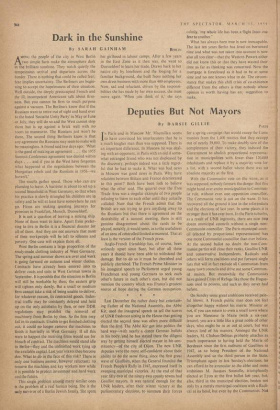Dark in the Sunshine
By SARAH AMONG the people of the city in West Berlin two simple facts make the atmosphere dark in the brilliant sunshine. They watch quietly the tempestuaus arrival and departure across the border. There is nothing that could be called fear; fear implies uncertainty. The Berliners are begin- ning to accept the hopelessness of their situation. . Well outside, the deeply preoccupied French and the ill, incompetent Americans talk about firm- ness. But you cannot be firm to much purpose against a vacuum. The Berliners know that if the Russians want to retire out of sight and hand over to the hated 'Socialist Unity Party' in May or June or July, they will do so and the West cannot stop them but is up against a brick wall with no room to manceuvre. The Russians just won't be there. The second thing Berliners know is that any agreement the Russians may seem to make will be meaningless. A friend said two days ago : 'What is the good of making an agreement . . . the 1955 Summit Conference agreement was denied within days . . and if you in the West have forgotten what happened at the negotiations between the Hungarian rebels and the Russians in 1956—we haven't.'
The results gather speed. Those who can are planning to leave. A barrister is about to set up a second household in West Germany, so that when his practice is slowly strangled his children are in safety and he will at least have somewhere he can go. Firms are making questing journeys for premises in Frankfurt, Munich, Duesseldorf.
It is not a question of leaving a sinking ship. None of them want to leave. Apart from prefer- ring to liVe in Berlin it is a financial disaster for all of them. And they are not unaware that most of their workpeople will be left to idleness and poverty. One case will explain them all.
West Berlin contains a large proportion of the ready-made clothing industry of West Germany. The spring and summer shows are over and work is going forward on autumn and winter clothes. Contracts have already been entered into to deliver coats and suits in West German towns in September. It is possible that the situation in Berlin will still be workable by then; the eastern grip will tighten only slowly. But a small or medium firm cannot take a risk bf being unable to deliver, for whatever reason, its contracted goods. Indus- trial traffic may be constantly delayed and held up on the only autobahn by then, or new DDR regulations may prohibit the removal of machinery from Berlin by then. So the firm may fail in its contracts. Unable to get finished clothing out, it could no longer remove the machines to finish it hurriedly in West Germany. If all this were to happen the receiving firms would sue for breach of contract. The machines would stand idle in Berlin—they and the unfinished work tying up the available capital. Last year's taxes then become due. What to do in the face of this risk? There is only one business answer, however reluctant: to remove the machines and key workers now while it is possible to protect investment and hard work and the future.
This single problem among many similar ones is the problem of a real human being. She is the only survivor of a Berlin Jewish family. She spent her girlhood in labour camps. After a few years in the East Zone as it then was, she went to Duesseldorf to learn her trade. Drawn back to her native city by loneliness and the longing for a familiar background, she built from nothing her own dress business with more than 400 employees. Now, sad and reluctant, driven by the responsi- bilities she has made by her own success, she must move again. 'When you think of it,' she says calmly, 'my whole life has been a flight from one fear to another.'
What has always been true is now inescapable. The last ten years Berlin has lived on borrowed time and what was not taken into account is now also all too clear—that the Western Powers either did not know this or that they have wasted their time as far as thinking was concerned. Now the mortgage is foreclosed as it had to be at some time and no one knows what to do. The circum- stance that makes this chill crisis of co-existence different from the others is that nobody whose opinion is worth having has any suggestion to make.


















































 Previous page
Previous page